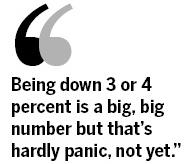SINGAPORE - Investors should consider paring their holdings after a plunge in US stocks on Thursday, according to Jim Rogers and Marc Faber.

Jim Rogers, chairman of Rogers Holdings.
Equities had a "normal correction" and were "overdue for a sell-off" after rallying from last year's low, Rogers, Singapore-based chairman of Rogers Holdings, told Bloomberg Television. "The market was overbought, ahead of itself and due for a correction," Faber, publisher of the Gloom, Boom & Doom report, said in a separate interview.US shares tumbled as waves of computerized trading exacerbated a sell-off triggered by Europe's debt crisis. While the rout briefly erased more than $1 trillion in US market value as the Dow Jones Industrial Average plunged as much as 9.2 percent, the gauge closed 3.2 percent lower, the biggest decline since only April 20. The Standard & Poor's 500 Index fell 3.2 percent, paring losses of as much as 8.6 percent.
"Being down 3 or 4 percent is a big, big number but that's hardly panic, not yet," Rogers said. According to Faber, recent declines suggest "that maybe we've made a major high in the latter part of April this year and that we will, from here on, have a more meaningful decline."

Investors should "be very careful and cut back" on their holdings if they have any "doubt," Rogers said. While a bankruptcy for Greece will be a "good thing" for the country and the euro, it may result in "great instability" for markets as investors worry about contagion in other economies including the United Kingdom and the United States, he said.
Faber also advised investors to consider reducing their positions on any rebound in share prices.
S&P 500 futures rose 0.5 percent on Friday. The Nasdaq OMX Group Inc said it will cancel trades of stocks that moved more than 60 percent.
Computerized trades sent to electronic networks turned an orderly decline into a rout, according to Larry Leibowitz, the chief operating officer of NYSE Euronext.
While the first half of the Dow's plunge probably reflected normal trading, the sell-off snowballed because of orders sent to venues with no investors willing to match them, Leibowitz said in an interview on Bloomberg Television.
Rogers, who predicted the start of the global commodities rally in 1999, favors so-called hard assets including silver on expectations of further "currency turmoil" in 2010 and 2011, he said.
Eleven of the world's 16 most-traded currencies have slid against the dollar since Oct 28, when Rogers said the US currency's rally may last for "a while".
Concern that a 110 billion-euro rescue package for Greece will need to be extended to other European nations has lifted borrowing costs for countries including Spain and Portugal and sent the euro to a 14-month low on Thursday.
Bloomberg News





